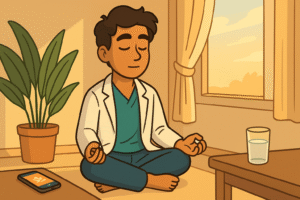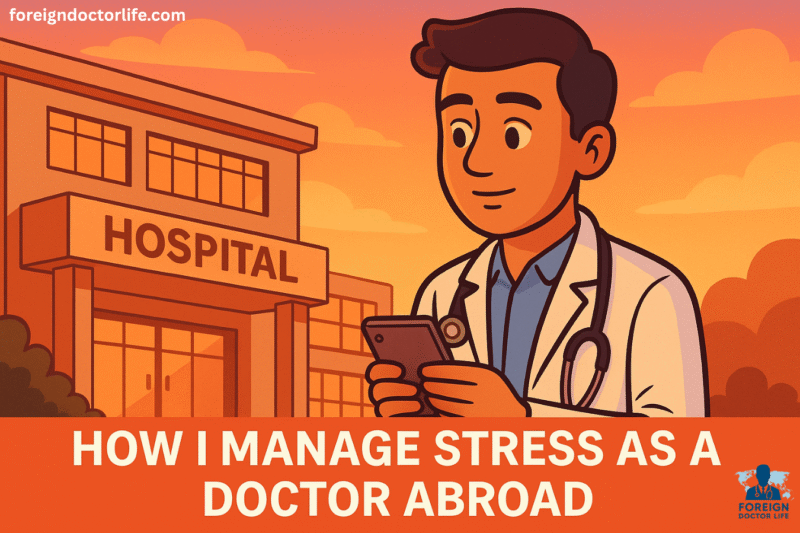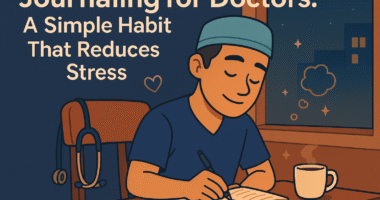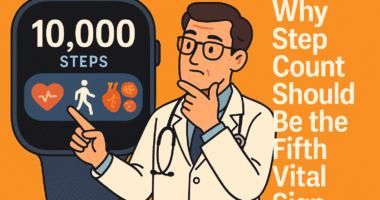The first time I landed my medical job abroad, I thought the biggest challenges would be clinical — new systems, unfamiliar medications, and different patient expectations. But I quickly learned that the toughest part wasn’t the medicine. It was managing stress.
Working as a doctor overseas means constantly balancing medical responsibilities with cultural adaptation, language barriers, and the quiet loneliness that comes from being far from home. Over time, I realized that stress isn’t something to fight against — it’s something to understand, manage, and learn from.
In this post, I’ll share the real strategies that helped me stay calm and grounded as a doctor working abroad. These are habits I’ve built through trial and error — and ones that any healthcare professional can adapt to find balance in a new environment.
The Hidden Pressures of Being a Doctor Abroad
From the outside, the life of a doctor overseas looks adventurous — new countries, modern hospitals, and career growth. But behind the scenes, it can also be isolating and mentally demanding.
When I first started working in a foreign hospital, everything felt different. The workflow, patient expectations, and even the tone of communication were unlike what I was used to back home. I often questioned myself: Am I doing enough? Am I fitting in?
Here are some of the hidden pressures I faced — and that many expat doctors silently endure:
-
Unfamiliar hospital systems: Learning new software, protocols, and documentation rules can be overwhelming at first.
-
Language barriers: Even small misunderstandings can lead to anxiety during busy shifts.
-
Cultural differences: Each country has its own hierarchy, patient interaction style, and approach to teamwork.
-
Limited support network: Being far from family means fewer emotional outlets and more bottled-up stress.
-
Shift irregularity: Rotating shifts, especially night duties, can easily disturb sleep and mood patterns.
At some point, I realized that I couldn’t control everything around me — but I could control how I responded. That mindset shift became my foundation for managing stress overseas.

Understanding My Stress Triggers
Before I could manage stress, I needed to understand it. I started by observing when my mood dropped or when I felt irritable or drained. Most of the time, it wasn’t because of one big event — it was the accumulation of small frustrations throughout the day.
My biggest triggers included:
-
Consecutive night shifts with little rest
-
Communication misunderstandings during emergencies
-
Feeling disconnected from family and friends
-
Pressure to perform perfectly in a new system
To manage these, I began journaling every night for just five minutes. It wasn’t about writing long reflections — just quick notes about what went well, what didn’t, and how I felt. Over time, this helped me notice patterns.
When I saw that sleep deprivation was my biggest trigger, I prioritized rest like a prescription. I also learned to separate “real emergencies” from “mental alarms” — those thoughts that spiral even when nothing’s wrong.
Recognizing your stress triggers is the first step to regaining control. It’s like diagnosing the underlying cause before treating the symptom.

Daily Habits That Keep Me Grounded
Small, consistent habits have a bigger impact than one-time vacations or stress-relief days. Here are the routines that transformed my daily stress into manageable rhythm.
1. Morning Reset Routine
Every morning, before checking my phone or hospital messages, I spend five minutes in silence. I take slow breaths, stretch, and visualize how I want my shift to go.
Some mornings, I do a short guided meditation. Other days, I just repeat a simple mantra like “I can handle today one patient at a time.”
This quick routine sets a calm tone for the day — especially before a busy ER shift or ward round.

2. Mini Breaks During Shifts
I used to think that working through breaks made me more productive. Now I know it only made me more tired and reactive.
So, I created a simple rule: two minutes every few hours for a reset. Sometimes that means stepping outside for fresh air, stretching my shoulders, or drinking water slowly instead of gulping between patients.
I even use a mini breathing technique:
Inhale for 4 seconds, hold for 4, exhale for 6.
It instantly lowers heart rate and resets focus — something I learned from the American Psychological Association’s guide on stress reduction.
3. Nighttime Unwind Ritual
After work, I don’t immediately dive into social media or TV. I take 15 minutes to journal or listen to calming music.
This small “transition ritual” signals my brain that the workday is over. On off days, I also walk near the beach — a privilege of living on an island — which helps me decompress both physically and mentally.
Building Emotional Resilience Overseas
Living abroad forces you to grow in ways you can’t plan for. I used to see stress as something to eliminate; now I see it as something to work through.
Here are lessons I learned about emotional resilience as a doctor abroad:
-
Accept what you can’t control. Patients, coworkers, and systems will challenge you — not everything can be perfect.
-
Reframe mistakes. Instead of dwelling on errors, I ask, “What did this teach me?” That mindset has saved me countless sleepless nights.
-
Build micro-support systems. A single trusted colleague, a group chat with fellow doctors, or a weekly call with family can make a world of difference.
-
Celebrate small wins. A successful patient recovery, a smooth shift, or even a smile from a coworker — acknowledging them builds positive momentum.
The key isn’t avoiding stress, but bouncing back faster each time it comes.

My Go-To Tools and Techniques
Managing stress abroad doesn’t always require big lifestyle changes. It’s often about having the right tools at the right time.
Here are some I rely on:
-
Meditation & Mindfulness Apps: Calm and Headspace for short guided sessions before shifts. You can also listen from Youtube and Spotify too.
-
Digital Journaling: I use Apple Journal to track reflections or gratitude lists.
-
Time Management Tools: Google Calendar for blocking rest periods and tasks, so my schedule doesn’t control me.
-
Physical Activity: Even a 20-minute evening run or park workout releases endorphins that reset my mood.
-
Community Support: Joining local expat or healthcare Facebook groups connects me with people who understand the experience.
On my blog, I’ve also shared:
👉 Top Cultural Shocks as a Foreign Doctor in the Maldives
Each of these tools doesn’t remove stress — but together, they build a safety net so I never fall too far.
Lessons I’ve Learned About Stress and Growth
After years of working overseas, I’ve realized that managing stress is a lifelong skill, not a one-time achievement.
Here’s what I’ve learned:
-
Stress isn’t the enemy — disconnection is. When we ignore stress, it grows. When we face it mindfully, it becomes manageable.
-
Boundaries protect your purpose. Learning to say no — to extra shifts, unnecessary commitments, or toxic environments — is an act of self-preservation.
-
Physical and mental health are intertwined. Sleep, hydration, and good nutrition directly influence emotional stability.
-
Gratitude changes perspective. Even on hard days, there’s always something to be thankful for — a recovered patient, a quiet moment, or sunrise after a long shift.
Working abroad has taught me that resilience isn’t about being unshakable — it’s about learning to bend without breaking.
Final Thoughts
Stress will always be part of a doctor’s life, especially when working overseas. But with the right mindset and habits, it doesn’t have to control you.
Today, I no longer see stress as something to escape from, but as a signal — a reminder to pause, breathe, and realign.
If you’re a healthcare professional living abroad, know that it’s okay to slow down. It’s okay to ask for help. And it’s okay to protect your peace while helping others heal.
How do you manage stress in your workplace?
I’d love to hear your thoughts — share them in the comments.










7 comments
Thank you
Thanks for sharing knowledge
Very important tips..
So thanks 👍